Snow Damage – ACCL Waterproofing
IS IT POSSIBLE FOR SNOW TO DAMAGE YOUR BASEMENT?
In the Toronto area, heavy snowstorms are typical. These storms can dump many feet of snow on the ground and stay there for days. When the temperatures rise and the snow melts, there will be nowhere for the excess water to go. You may wind up with a leaking basement if your basement is not prepped for the weather before winter. It’s critical to get moisture out of your basement before it causes more foundation damage. Let’s take a look at how snow might harm your basement.
Damage to the foundation
The most common cause of winter water damage is snowmelt. Winter’s repeated freezing and thawing will erode the foundation over time. Moisture freezes and expands, causing breaches in your basement and allowing more water to enter. This cycle continues, producing cracks in the foundation and compromising its structural stability. A weaker foundation can also result in a cracked pipe, allowing air into your basement and putting your pipes at risk of freezing.
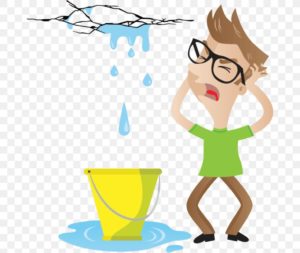
Ice can cause damage to your roof and gutters
An ice dam is a buildup of ice along the edges of your roof that can damage your gutters, get below your shingles, and leak into your home. Hanging icicles are a symptom of an ice dam. Uneven heat on your roof causes ice dams to grow. When the attic is warm, the snow in the middle of the roof melts. That snow falls to the ground and freezes at the rim. When water freezes, it expands, damaging your shingles, causing roof cracks, and breaking off your gutters.
Floors with Cracks
In unfinished basements, any moisture can wreak havoc on hardwood, laminate, carpeted, and even concrete floors. Hardwood and laminate flooring will flex and warp when the moisture is removed and the basement is dry. The glues that hold the floor tiles together will eventually wear out, causing the floor to bubble or the tiles to fall out.
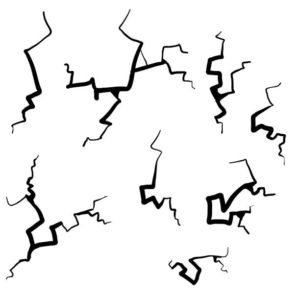
Damage to the Sump Pump
Double-check that your sump pump hose doesn’t have any low locations where water can accumulate. Make sure the water is flowing freely away from your house. The sump will cease working if the water collects and freezes, and it may possibly cause irreparable damage to the system. Because sump pumps are located in the basement and are out of sight, many homeowners overlook them. The sump pump, on the other hand, is one of the most important elements in adequately protecting your pipes from freezing damage.
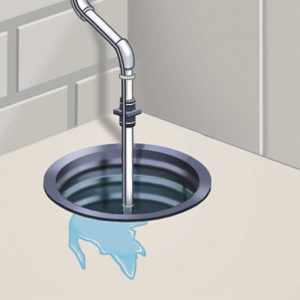
At ACCL Waterproofing, we have over 30 years of experience in delivering leak-free waterproofed basements for our customers. Contact us right away to schedule a complimentary estimation with one of our friendly and knowledgeable staff members.
Take advantage of the winter months to have us look at your basement and help you determine how best to address your basement leakage problems.

Get the job done RIGHT – Hire a professional Waterproofing company!
Want to know more about our waterproofing process? Give us a call at 416-759-2995
Rely On our ACCL Wet Basement Waterproofing Experts
Don’t Drown in a wet basement!
Rely On Wet Basement Waterproofing Experts
If you’ve noticed foundation cracks, spots, water, mold, and mildew, don’t ignore the signs or it could lead to more damage and possible health effects.
The basement waterproofing specialists at ACCL Waterproofing know how to repair your basement and foundation walls and keep moisture out of your basement. We would be pleased to develop a guaranteed solution to keep your basement dry!
Dry Basement: ACCL Waterproofing
WHY IS IT SO IMPORTANT TO KEEP YOUR BASEMENT DRY THIS WINTER?
Winterizing our homes, from storm windows to roof repair, takes a lot of time. What about the basement, though? Our basements, as well as the foundations of our houses, require attention.
When it comes to wreaking havoc on our homes, winter is the worst. That alone is reason enough to ensure that your home is well-protected during the winter months.
WHY IS IT SO IMPORTANT TO KEEP YOUR BASEMENT DRY DURING THE WINTER?
During the winter months, there is greater indoor activity, even in our basements. It’s crucial to keep it dry whether it’s totally finished or being used for storage.
MOLD AND MILDEW
Mold and mildew can grow quickly in the absence of sunlight and heat. They can grow to be quite large before you even realize it. It can begin to emit a foul stench and penetrate objects such as carpets, clothing, and furniture.
The odour and mold can be deadly, and it’s nearly impossible to get rid of them. Mold will be kept at bay in your basement if you keep it warm and dry. It can ruin your furniture and clothing to the point that you’ll have to toss them away.
LEAKS
Leaks may be discovered in many areas of your basement. Groundwater, melted snow, rainfall from the eaves, or even a busted pipe can wreak havoc on a foundation with weak places.
During the colder months, the temperature can swing dramatically, causing large amounts of water to flow and subsequently freeze. The sun’s heat can melt ice or snow, causing it to run into the basement, even on a cold day.
If the leaks get severe enough, they can cause damage to flooring, carpets, and the electrical system, resulting in electric shock, power outages, and appliance damage.
CRACKS
Your foundation will always have minor flaws in it. They can be found on the walls, ceilings, doors and windows, and stairwells. Small cracks that are left to their own devices aren’t a big deal.
In the winter, however, due to the changing temperature, water might accumulate in the cracks, thaw, freeze, and then melt again. Because ice takes up more area than water, it will require additional space to expand. These ice fissures can lead to much more serious issues.
THE FOUNDATION IS WEAKENED
When water or moisture seeps into the concrete’s cracks, gaps, and pockets, it can lead to worse difficulties and holes. There can be a lot of damage caused by water freezing and melting, as well as water flowing around in cracks and around the foundation’s base.
It’s possible that shifting will occur if the foundation is destroyed. Damaged or broken door and window frames, slanted floors, and even a wall breaking or collapsing are all possibilities.
THINKING ABOUT WATERPROOFING YOUR BASEMENT?
A few leaks or cracks might quickly add up. If you have dampness or water damage, get it cleaned as soon as possible. The best approach to keep your basement dry is to have it waterproofed by a professional.
Take advantage of the winter months to have us look at your basement and help you determine how best to address your basement leakage problems.

Get the job done RIGHT – Hire a professional Waterproofing company!
Want to know more about our waterproofing process? Give us a call at 416-759-2995
Rely On our ACCL Wet Basement Waterproofing Experts
Don’t Drown in a wet basement!
Rely On Wet Basement Waterproofing Experts
If you’ve noticed foundation cracks, spots, water, mold, and mildew, don’t ignore the signs or it could lead to more damage and possible health effects.
The basement waterproofing specialists at ACCL Waterproofing know how to repair your basement and foundation walls and keep moisture out of your basement. We would be pleased to develop a guaranteed solution to keep your basement dry!
Controlling Dust and Debris: ACCL Waterproofing
Controlling Dust and Debris: ACCL Waterproofing
Is it required to use Dust Suppression?
Absolutely, and for a variety of reasons. Dust suppression becomes a major concern while removing concrete with a jackhammer. the jackhammer’s repeated motion tears down concrete and creates a fine dust particle. This dust is easily airborne and can go a long distance, causing a huge mess. It’s nearly hard to clean everything up completely.
How can we keep the dust at bay?
The EnviroBoot contact person. This boot is attached to a heavy duty HEPA level filtration vacuum cleaner and fits over the jackhammer’s housing. The dust is quickly suctioned up at the point of contact and into the HEPA vacuum as the jackhammer creates it.
Lime Dust –
This airborne particulate is hazardous to one’s health. Sand, stone, and lime are the main components of concrete. Concrete is mostly made up of lime (and there is a lot of lime in concrete). It’s the glue that holds sand and stone together, yet it’s also highly poisonous to human tissue. The small particulate’s airborne nature makes it simple to inhale lime dust, posing a health risk to everyone living in the residence. It irritates the eyes and inflames the sinuses, therefore contact should be kept to a minimum. ACCL Waterproofing goes to great lengths to avoid this issue.
Containment of Dust in the entire room –
In the center of the basement, a negative air machine is put up. Through a huge HEPA filter, it pulls a significant amount of air from all directions. Even though the air that passes through the filter is perfectly clean, we nevertheless vent it outside. We vent outside to keep any air movement in the basement to a minimum. This method is exceptionally effective and results in a completely dust-free installation.
In the end, it’s all about safeguarding one of your most valuable assets: your home. We understand how critical it is to hire the appropriate personnel who will deliver the results you need at the right price. We have a long list of satisfied customers who can speak to our honesty and trustworthiness. Invite us to provide you with a free examination and quotation right now.
Take advantage of the warmer summer months to have us look at your basement and help you determine how best to address your basement leakage problems.

Get the job done RIGHT – Hire a professional Waterproofing company!
Want to know more about our waterproofing process? Give us a call at 416-759-2995
Rely On our ACCL Wet Basement Waterproofing Experts
Don’t Drown in a wet basement!
Rely On Wet Basement Waterproofing Experts
If you’ve noticed foundation cracks, spots, water, mold, and mildew, don’t ignore the signs or it could lead to more damage and possible health effects.
The basement waterproofing specialists at ACCL Waterproofing know how to repair your basement and foundation walls and keep moisture out of your basement. We would be pleased to develop a guaranteed solution to keep your basement dry!
Weeping Tiles
What are Weeping Tiles?
Weeping tiles are 4-inch pipes used to discharge water from underground and redirect water away from the client’s home.
How do they work?
How weeping tiles work is that the pipes are placed with holes side up into a trench around the exterior perimeter of the home or in the interior under the basement floor. As water begins to rise it will insert itself within the holes and flow out of the pipes away from the client’s home. This can either be through a sump pump or to a drainage system away from the residence.
What type of weeping tiles are there?
There are two categories of weeping tiles: Exterior and Interior tiles. Exterior weeping tiles manage water at ground level before it can seep into the basement. It consists of a dug out trench, gravel, and a pipe. Water than soaks into the ground, through the gravel, and through the holes in the pipe to be swept away from the home. Interior weeping tiles is usually solely used when the exterior method has proven non-successful. This system is installed in the basement where water is directed to a sump pump. A deep trench is cut around the perimeter of the basement where a pipe is filled inside, filled with gravel, and covered with concrete to seal.
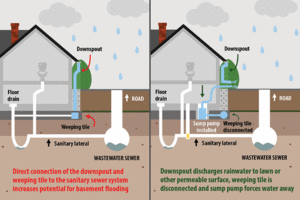
How do you tell if your weeping tile is clogged?
Weeping tiles can become clogged by roots or soil causing the water not being able to drain away and begins to press against the house’s foundation. This added pressure is the cause of various cracks and leaks within the foundation of the home.
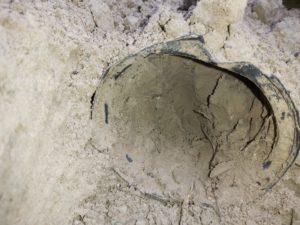
How do you unclog a weeping tile?
The most simple way to unclog a weeping tile is merely getting it replaced. Trying to physically unclog it yourself will result in more damage to the drain and could take a serious amount of time. It is also usually cheaper to simply replace the tile, especially if you’re under warranty by a waterproofing professional. All exterior waterproofing work is quoted under a 30 year warranty through ACCL, so a clogged weeping tile can be easily managed by professional help.
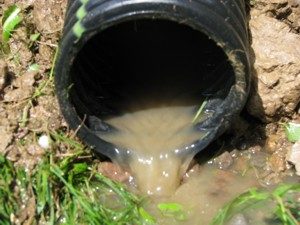
Sump Pumps
What is a Sump Pump?
A sump pump is a method that reduces the risk of water damage in your home. It halts leakage in the underground part as it is installed in most cases the basement of the home. Sump Pump are usually 2 feet deep and 18 in diameter. When water reaches a certain level the switch within in the pump activates, preventing expelled water from flowing into the pit.
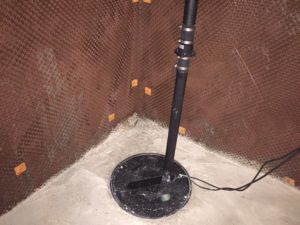
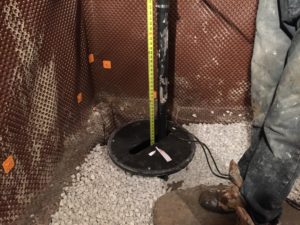
Types of Sump Pumps
Sump Pumps are either a primary method or a backup and most homes should have one of each. Primary sump pumps do most of the work while the backup is only there incase of a failure or if it cannot keep up to the water flow. There are two main sump pumps: submersible and pedestal. Either type can be the primary or backup. Submersible pumps are bulkier and sit right into the sump pump, functioning under water. Since being inside of the pit they are quieter than pedestal pumps but are more expensive. Also, they are harder to reach for maintenance.
Pedestal pumps are long and sit upright with the motor on top causing them to be nosier than the previous pump. They’re less expensive and easier to access for repairs, however, some experts consider them less reliable compared to submersible pumps.
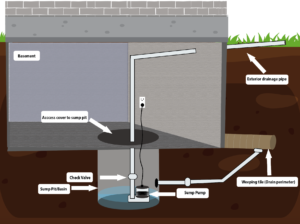
Types of backup Sump Pumps
A common type of backup pump is a battery operated backup which does not replace the primary sump pump. Instead, they only begin working if the primary halts due to a power outage or any other reason. They’re usually connected to a large battery, such as a car or marine battery.
Water powered backups aren’t connected to an electrical current as they’re powered by water pressure. They have unlimited runtime but they need a strong flow of water like the high-pressure flow of a city’s water system. Also, they’re more difficult to install compared to their counterpart.
Finally, the duration of most sump pumps last for approximately 10 years, however, it’s all due to the upkeep and cleanliness of the pump which relates to it’s life expectancy.

